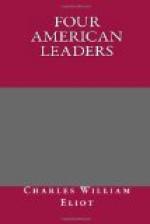For those of us who have attended to the outburst of novels and treatises on humble or squalid life, to the copious discussions on child-study, to the masses of slum literature, and to the numerous writings on home economics, how true to-day seems the following sentence written in 1837: “The literature of the poor, the feelings of the child, the philosophy of the street, the meaning of household life are the topics of the time.”
* * * * *
I pass now to the last of the three topics which time permits me to discuss,—Emerson’s religion. In no field of thought was Emerson more prophetic, more truly a prophet of coming states of human opinion, than in religion. In the first place, he taught that religion is absolutely natural,—not supernatural, but natural:—
“Out from the heart of Nature rolled
The burdens of the Bible old.”
He believed that revelation is natural and continuous, and that in all ages prophets are born. Those souls out of time proclaim truth, which may be momentarily received with reverence, but is nevertheless quickly dragged down into some savage interpretation which by and by a new prophet will purge away. He believed that man is guided by the same power that guides beast and flower. “The selfsame power that brought me here brought you,” he says to beautiful Rhodora. For him worship is the attitude of those “who see that against all appearances the nature of things works for truth and right forever.” He saw good not only in what we call beauty, grace, and light, but in what we call foul and ugly. For him a sky-born music sounds “from all that’s fair; from all that’s foul:”—
“’Tis not in the high stars
alone,
Nor in the cups of budding
flowers,
Nor in the redbreast’s mellow tone,
Nor in the bow that smiles
in showers,
But in the mud and scum of things
There alway, alway something sings.”
The universe was ever new and fresh in his eyes, not spent, or fallen, or degraded, but eternally tending upward:—
“No ray is dimmed, no atom worn,
My oldest force is good as
new,
And the fresh rose on yonder thorn
Gives back the bending heavens
in dew.”




